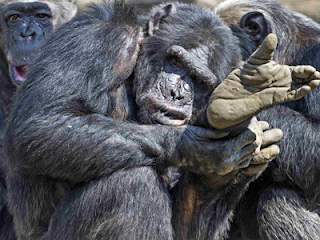Kinds of understanding that were thought to exist only in
humans might also be shared by apes,
according to new research.
It's long been known by humanity that the way we
see the world and what it's actually like are different things. But that
knowledge - that a person might think things about reality that aren't true -
was thought to be held only by us, and to be a key part of the kinds of
advanced consciousness that humans have.
New research with chimpanzees, bonobos and orangutans, however, suggests that our distant relatives might be able
to know the same thing. Apes can tell if you're making a mistake, it has found.
That puts it on the same level of cognitive development as a human child. We
tend to develop the kind of awareness that someone is wrong in early childhood,
around the age of five.
When we do, we are on our way to developing the
ability to fully comprehend what other people are thinking and feeling.
Scientists call that idea Theory of Mind, and the development of it is one of
the things previously thought to belong only to humans. Some humans do lack the
ability to infer things about other people's thoughts and feelings, but that
tends to be an early sign of autism.
"This cognitive ability is at the heart of so
many human social skills," said Christopher
Krupenye of Duke, who led the
study along with comparative psychologist Fumihiro Kano of Kyoto University.
Having that ability allows us to get along with
other people, help them out and figure our way around the world. They can be
used negatively, too, to trick people into thinking things that aren't the case.
And it was that skill for trickery that allowed
scientists to test what apes know about what others are thinking. In the study,
scientists showed the apes two short videos. In one, a person in a King Kong suit hides himself in one of two
haystacks while a man watches. The man then leaves through a door, and the
person in the King Kong suit runs away while he can't see. The man then comes
back in through the door and tries to find King Kong. In the other video, the
man returns to the scene after to find a stone that he saw being hidden by King
Kong. But while the man was away, King Kong has taken the stone out of the box
and left.
The scientists then watched the movement of the
apes eyes while they were watching each of the videos. By doing so, they were
able to make some approximation of what they were thinking. If the apes pass
they test, they'll be able to tell that when the man comes back he will still
want to look for the stone in the place where he last saw it - even though the
apes have seen it being stolen and taken somewhere else. That requires the kind
of awareness thought to belong only to humans, because it needs them to be able
to tell that the man thinks something about the world that isn't actually the
case.
The result of the test - referred to as the "false belief test" - were similar to those found in humans that are under the age of two.
"This is the first time that any nonhuman animals have passed a version of the false belief test," Krupenye said. "If future experiments confirm these findings, they could lead scientists to rethink how deeply apes understand each other."
The research was conducted by scientist at Duke University, Kyoto University and the Max Planck Institute for Evolutionary Anthropology. It will be published this week in the journal Science.
---------------------------------------------The Independent -----------------------------------------------------












No comments:
Post a Comment